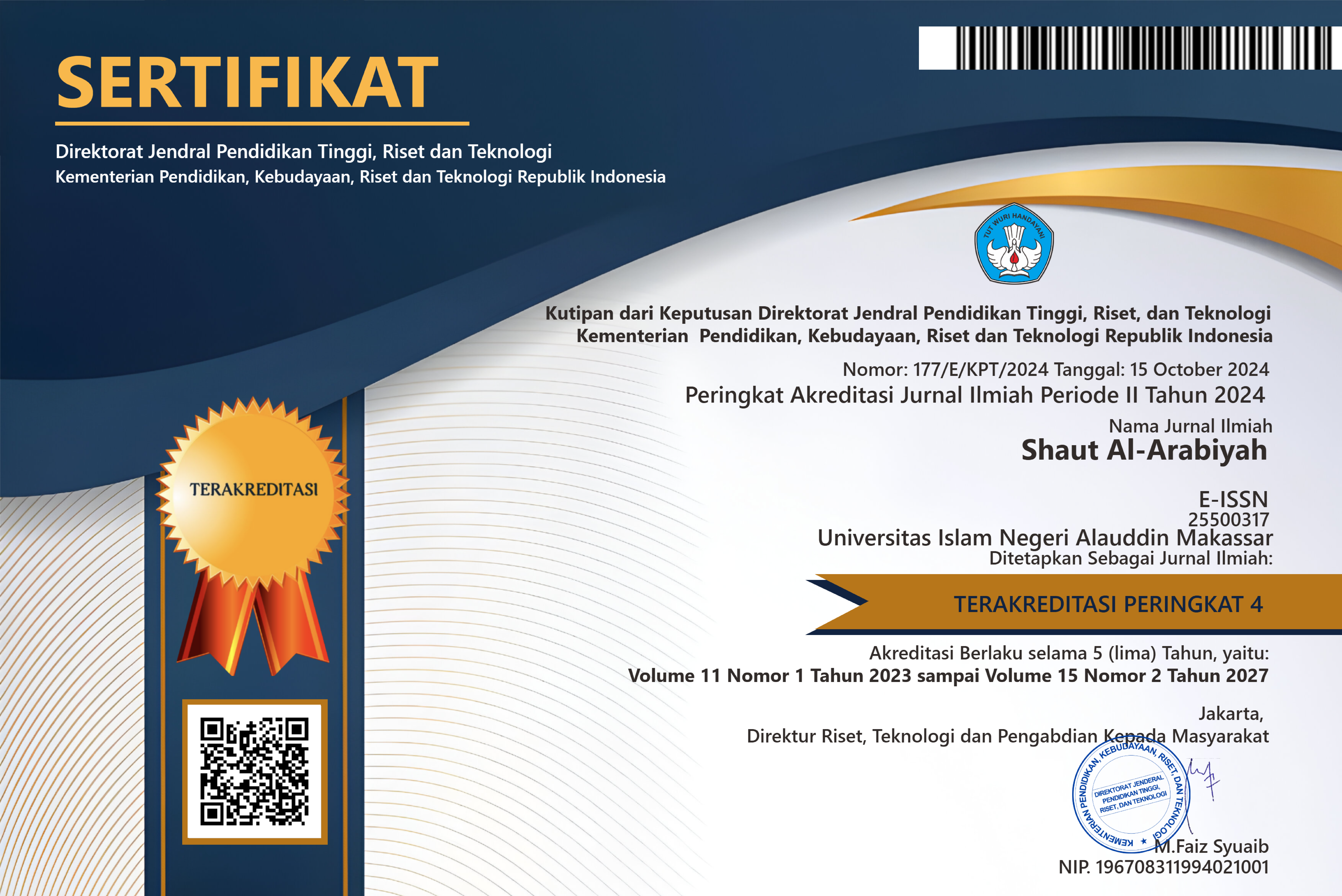The Innovative Strategies of Arabic Language Education Lecturers in the Era of Digital Disruption for Student Character Formation
DOI:
https://doi.org/10.24252/saa.v13i2.60890Keywords:
Arabic Language, Innovation, Educational Games, Arabic, Gamification, Balaghah science learning, digital game concept, learning multimedia, learning technology.Abstract
This study aims to identify and analyze innovative strategies in Arabic Language Education (PBA) learning at the university level in the era of digital disruption. The research employed a library research method by reviewing relevant scientific articles published between 2023 and 2025. The findings reveal five major categories of innovative strategies: (1) the use of interactive visual media, (2) gamification in learning, (3) project-based learning and role-play, (4) the utilization of adaptive Learning Management Systems (LMS) powered by artificial intelligence (AI), and (5) the integration of mobile learning and Islamic applications. These strategies have been proven to enhance student engagement, motivation, and comprehension of PBA content. However, their implementation faces challenges such as limited infrastructure, lecturers’ digital literacy, and potential technological distractions. This study recommends collaboration among educators, educational technology developers, and university policymakers to create relevant, effective, and value-based PBA learning.
Keywords: Arabic Languange Education, innovative strategies, digital disruption era, gamification
References
Bula, R. F., and Supiah. (2025). “Inovasi Pembelajaran PBA di Era Digital: Pengembangan Video Animasi Interaktif sebagai Media Edukatif.” Jurnal Pustaka Cendekia Pendidikan 3, no. 1: 20–26. PT Pustaka Cendekia Group. https://doi.org/10.70292/jpcp.v3i1.128.
Christensen, Clayton M., Michael E. Raynor, and Rory McDonald. (2016). “What Is Disruptive Innovation?” Harvard Business Review 94, no. 12: 44–53.
Falah, Z., Syahlarriyadi, and Ropitasari, A. (2025). “Strategi Pembelajaran Inovatif Berbasis Teknologi Digital: Pendekatan Adaptif dan Diferensial.” SYAIKHONA: Jurnal Magister Pendidikan Agama Islam 3, no. 1. https://doi.org/10.59166/syaikhona.v3i1.284.
Falah, Z. (2025). “Strategi Pembelajaran Inovatif Berbasis Teknologi Digital: Pendekatan Adaptif dan Diferensial.” SYAIKHONA: Jurnal Magister Pendidikan Bahasa Arab 3, no. 1. https://doi.org/10.59166/syaikhona.v3i1.284.
Hasibuan, R. P., Makruf, M., and Gusmaneli, G. (2025). “Strategi Pembelajaran PBA Berbasis Teknologi Digital untuk Meningkatkan Literasi Keagamaan.” AL-MUSTAQBAL: Jurnal Bahasa Arab 2, no. 2: 1–12. https://doi.org/10.59841/al-mustaqbal.v2i2.90.
Hasibuan, M., Lubis, A., and Siregar, F. (2024). “Kolaborasi Digital dalam Pembelajaran Bahasa untuk Penguatan Karakter Mahasiswa.” Jurnal Pendidikan Karakter 14, no. 1 : 23–35. https://doi.org/10.xxxx/jpk.v14i1.54321.
Lickona, Thomas. (2012). Educating for Character: How Our Schools Can Teach Respect and Responsibility. New York: Bantam Books
Muslich, Masnur. (2021). Pembelajaran Bahasa Arab di Era Digital: Tantangan dan Peluang. Malang: UIN Malang Press.
Raniyah, F., Hasnah, N., and Gusmaneli, G. (2024). “Pengembangan Strategi Pembelajaran Kreatif dan Inovatif Pendidikan Bahasa Arab (PBA) di Era Digital.” Dewantara: Jurnal Pendidikan Sosial Humaniora 3, no. 2: 29–37. https://doi.org/10.30640/dewantara.v3i2.2438.
Wahyudi, T. (2023). “Membangun Strategi Pembelajaran Pendidikan Bahasa Arab Era Revolusi Industri 4.0 dan Society 5.0.” Al-Mutharahah: Jurnal Penelitian dan Kajian Sosial Keagamaan 20, no. 1: 148–159. https://doi.org/10.46781/al-mutharahah.v20i1.670.
Downloads
Published
How to Cite
Issue
Section
License
Copyright (c) 2025 Ulfah Nurfadhila, Siti Sofiyyahs

This work is licensed under a Creative Commons Attribution-NonCommercial-ShareAlike 4.0 International License.
















